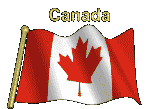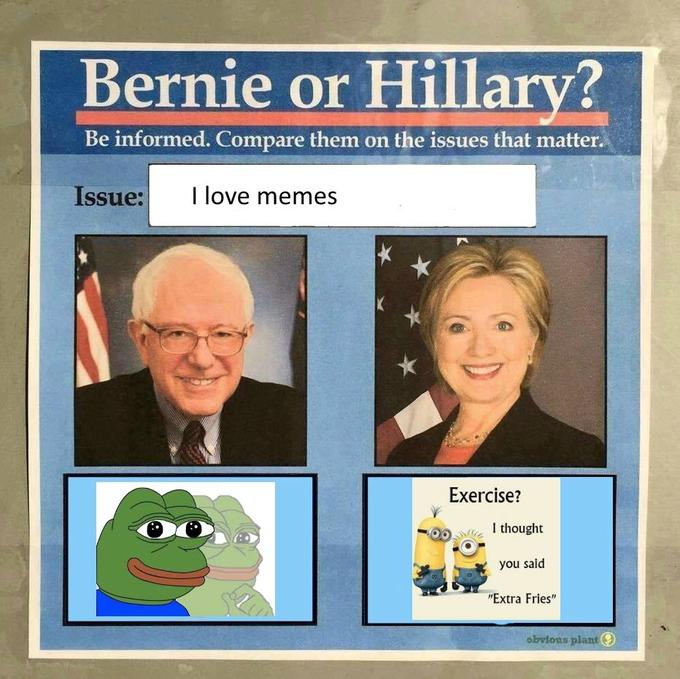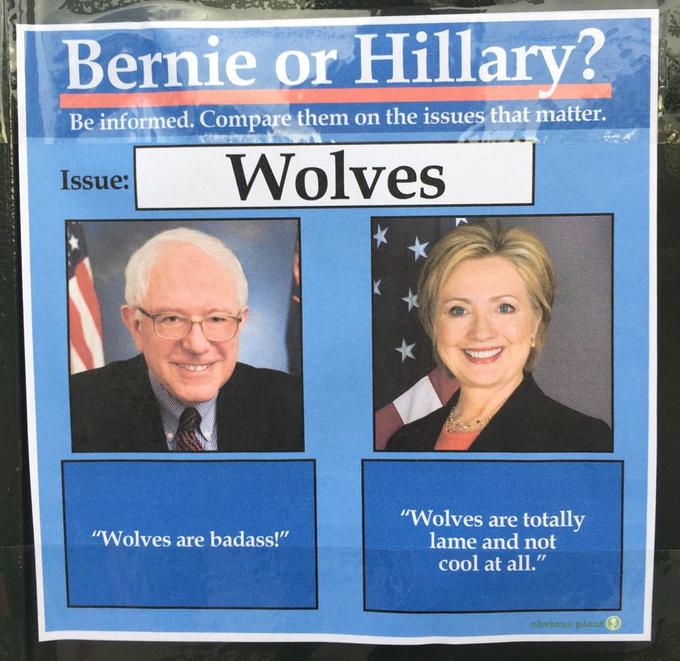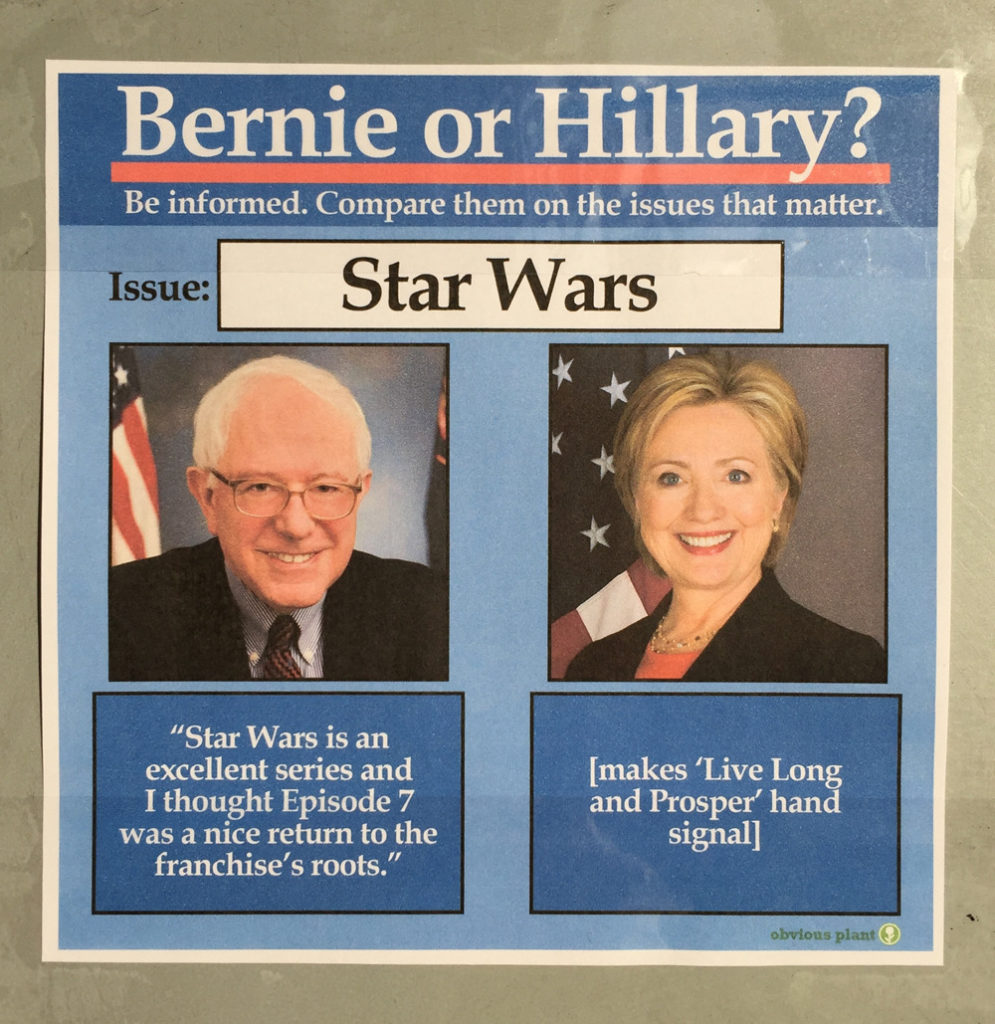By Nick Gertler
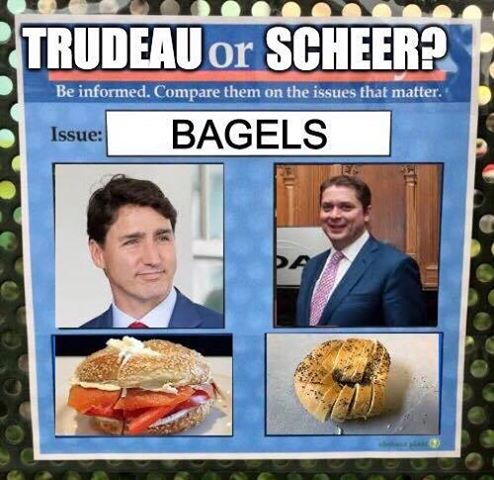
About and Origin
This meme is an instance of “On the Issues” or “Bernie or Hillary,” an object label Photoshop meme template based on a series of posters put up in the streets of Los Angeles during the 2016 American Democratic Party presidential primary. The original posters compared then candidates Bernie Sanders and Hillary Clinton on issues such as “wolves”—which Bernie thinks are “badass” while Hillary believes that they’re “lame and not cool at all”—and Star Wars, which Bernie has a nuanced take on and Hillary confuses with Star Trek. The posters became a meme format and were iterated on during the 2016 US election and beyond.[1]
Context and Circulation
The “On the Issues: Bagels” meme was posted on October 16th, 2019 by the National Meme Board of Canada (NMB).[2] The NMB describes itself as being overtly Liberal partisan and it “memefied” Liberal talking points and anti-Conservative attacks throughout the 2019 Canadian federal election.
The post itself garnered 211 reactions. It was shared 31 times and commented on 31 times. While the meme itself was pro-Liberal and pro-Trudeau, commenters didn’t exactly take the meme in that way. Some indicated their preference for NDP leader Jagmeet Singh, while others alluded to the Trudeau blackface scandal.[3]
Analysis
Sometimes a bagel isn’t just a bagel. Bagels and food in general carry strong cultural identifications that can act as a stand-in for a host of cultural, geographic, and socio-economic associations. One only need to look to the ongoing Montreal vs New York bagel debates to know that this is the case. The two city’s bagels have their formal distinctions—such as the Montreal bagel’s use of honey, and New York’s doughier bagel—but ultimately it is one’s history and cultural upbringing that tend to determine preference.
Further, as Daniel Schill contends, images in politics serve as a sort of short-hand. Images that demonstrate similarity between a candidate and a voter can create a positive association—an identification—with that candidate.[4]The “On the Issues: Bagels” meme employs this identification function of political images and using bagels as a cultural short-hand to identify each leader with a set of values.
In the Canadian context, Trudeau’s bagel from this meme identifies him with Montreal, where a bagel of this sort is most readily available. The toppings—lox, which is often associated with Jewish culture, and a healthy serving of cream cheese—associate Trudeau with a sense of worldliness and abundance. Taken together, Trudeau’s bagel identifies him with culturally diverse and generally more progressive metropolitan areas.[5]
Meanwhile, Scheer’s un-garnished bagel almost certainly isn’t the Montreal kind. But the way in which it is sliced—top down, rather than across the middle—is what really sets Scheer’s bagel apart. Regardless of personal preference, it is cut in such a way that is antithetical to the institution of the Montreal bagel. It identifies Scheer as being in opposition to the values one can identify in Trudeau’s bagel of choice.
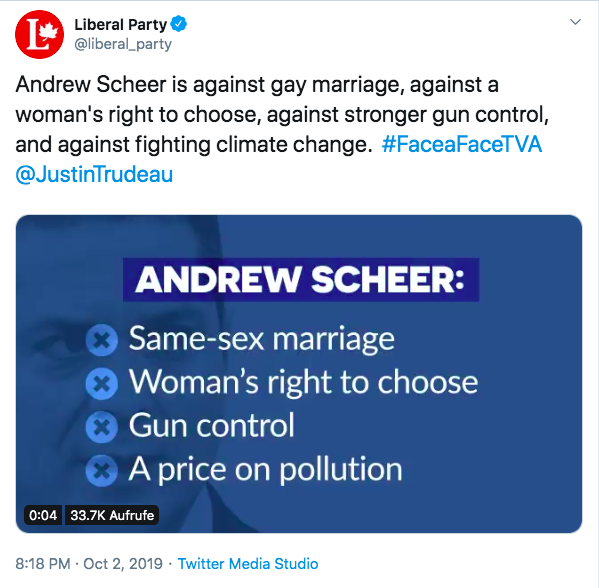
This representation is consistent with how the Liberal Party has attempted to brand Scheer. The Conservatives tried to play themselves up as being conservative in the economic sense, the Liberals tried to frame Scheer’s party as being socially conservative. Just a few days before this meme was posted, for example, Trudeau argued at a campaign event in New Brunswick that only a Liberal government would increase women’s access to health care, while alluding to Scheer’s anti-abortion stance.[6]
This attempt at oppositional branding is an example of “anti-branding” or “debranding.”[7] Both refer to deliberate attempts from an outside actor to attach a negative valence to an opposing actor’s brand. This was notably used in Canadian politics by the Conservative party themselves who, in the early 2000s, sought to gain a relative brand advantage over the Liberal’s by running ads portraying Liberal leaders as elite and out of touch.[8]
Scheer was a relative unknown on the Canadian political scene prior to his election as leader of the Conservative Party. As Speaker of the House for the later part of Steven Harper’s tenure as Prime Minister, it had been his job to stay out of the political limelight.[9] This left a brand void to be filled, and while the Conservative Party did its best to brand Scheer themselves, it also gave the Liberal’s an opportunity to anti-brand Scheer and define his brand for him.
The “On the Issues” meme format as a whole lends itself to this attempt to anti-brand Scheer. The upper text of the template reads “Be informed. Compare them [the candidates] on the issues that matter.” In this instance as well as with most iterations of this meme format, the featured “issues that matter” are apolitical (in this case, bagels). The format itself, then, is a good match for a brand-based model of political communication which blurs the line between the political and the apolitical.[10] The format as a whole places cultural identification at the center of politics. In the end, then, the meme’s argument is clear: what’s important in politics is how your cultural values align with the candidate, and if you’re a progressive, you align with the Liberal Party.
References
[1] “Bernie or Hillary?,” in Know Your Meme, October 2019.
[2] National Meme Board of Canada, “Sent in by a Follower,” Facebook, October 16, 2019.
[3] CBC News, “What We Know about Justin Trudeau’s Blackface Photos — and What Happens Next,” CBC, September 20, 2019.
[4] Daniel Schill, “The Visual Image and the Political Image: A Review of Visual Communication Research in the Field of Political Communication,” Review of Communication 12, no. 2 (April 2012): 118–42.
[5] David McGrane, Loleen Berdahl, and Scott Bell, “Moving beyond the Urban/Rural Cleavage: Measuring Values and Policy Preferences across Residential Zones in Canada,” Journal of Urban Affairs 39, no. 1 (January 2, 2017): 17–39.
Elisabeth Gidengil et al., “The Changing Social Bases of Party Support,” in Dominance & Decline: Making Sense of Recent Canadian Elections (Toronto: University of Toronto Press, 2012), 19–36.
[6] Zane Woodford, “Justin Trudeau Urges Voters to Choose ‘progressive Government’ during Halifax Campaign Stop,” The Toronto Star, October 15, 2019.
[7] Chad M. Milewicz and Mark C. Milewicz, “The Branding of Candidates and Parties: The U.S. News Media and the Legitimization of a New Political Term,” Journal of Political Marketing 13, no. 4 (October 2, 2014): 233–63.
Alex Marland, “Brand Discipline and Debranding,” in Brand Command (UBC Press, 2017), 165–200.
[8] Alex Marland and Tom Flanagan, “Brand New Party: Political Branding and the Conservative Party of Canada,” Canadian Journal of Political Science 46, no. 4 (December 2013): 951–72.
[9] Alex Boutillier, “Andrew Scheer’s Political Ascent Marked by Victories against Long Odds,” The Toronto Star, October 12, 2019.
[10] Alex Marland, “Preface: Branding, Message Control, and Sunny Ways,” in Brand Command (UBC Press, 2017), xiii–xxviii.

